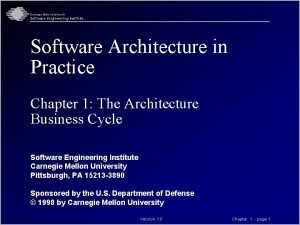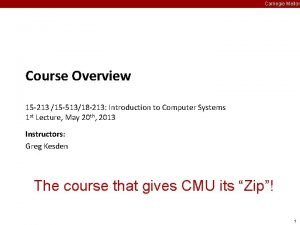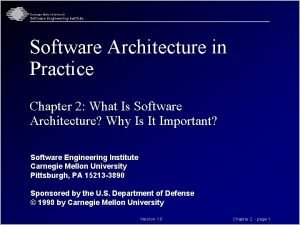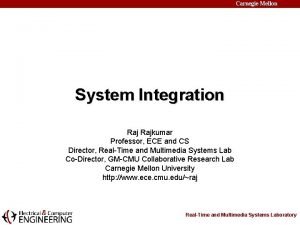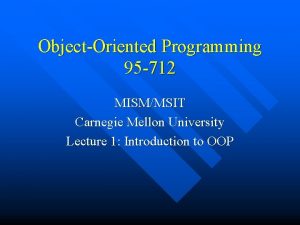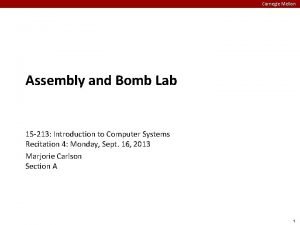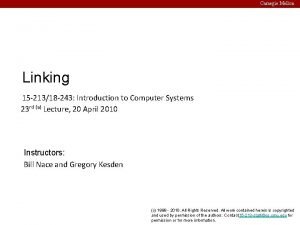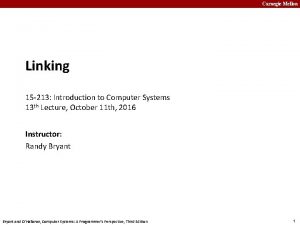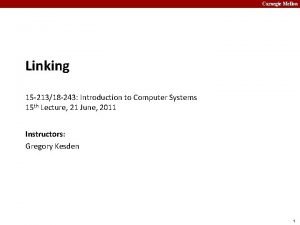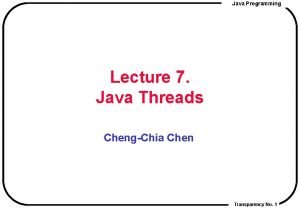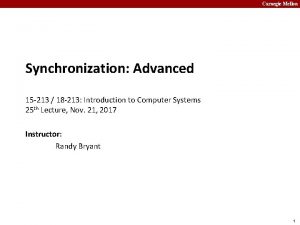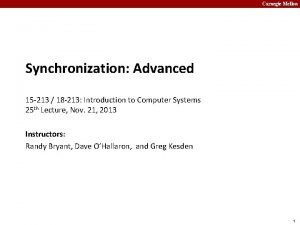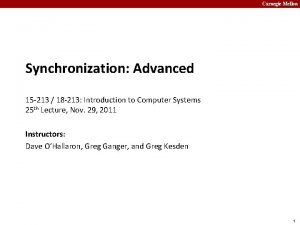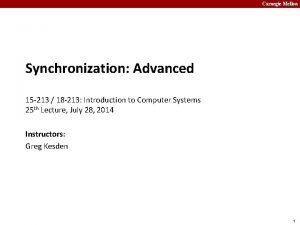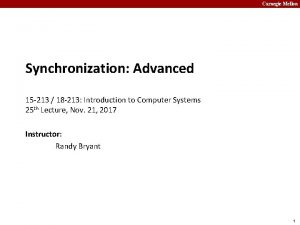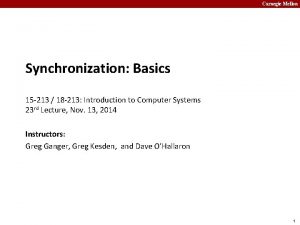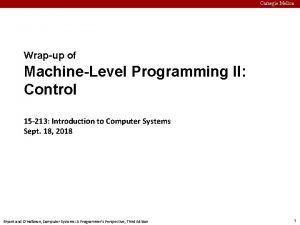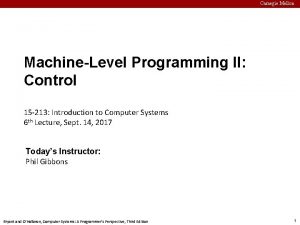Carnegie Mellon Synchronization Advanced 15 213 18 213









































![Carnegie Mellon Deadlocking With Semaphores int main(int argc, char** argv) { pthread_t tid[2]; Sem_init(&mutex[0], Carnegie Mellon Deadlocking With Semaphores int main(int argc, char** argv) { pthread_t tid[2]; Sem_init(&mutex[0],](https://slidetodoc.com/presentation_image_h2/7437d641baf8ba3da71cb14d98f0e894/image-42.jpg)















- Slides: 57

Carnegie Mellon Synchronization: Advanced 15 -213 / 18 -213: Introduction to Computer Systems 25 th Lecture, Nov. 22, 2016 Instructor: Randy Bryant 1

Carnegie Mellon Reminder: Semaphores ¢ ¢ Semaphore: non-negative global integer synchronization variable Manipulated by P and V operations: § P(s): [ while (s == 0) wait(); s--; ] Dutch for "Proberen" (test) § V(s): [ s++; ] § Dutch for "Verhogen" (increment) § ¢ OS kernel guarantees that operations between brackets [ ] are executed atomically Only one P or V operation at a time can modify s. § When while loop in P terminates, only that P can decrement s § ¢ Semaphore invariant: (s >= 0) 2

Carnegie Mellon Review: Using semaphores to protect shared resources via mutual exclusion ¢ Basic idea: § Associate a unique semaphore mutex, initially 1, with each shared variable (or related set of shared variables) § Surround each access to the shared variable(s) with P(mutex) and V(mutex) operations mutex = 1 P(mutex) cnt++ V(mutex) 3

Carnegie Mellon Today ¢ Using semaphores to schedule shared resources § Producer-consumer problem § Readers-writers problem ¢ Other concurrency issues § Thread safety § Races § Deadlocks 4

Carnegie Mellon Using Semaphores to Coordinate Access to Shared Resources ¢ Basic idea: Thread uses a semaphore operation to notify another thread that some condition has become true § Use counting semaphores to keep track of resource state. § Use binary semaphores to notify other threads. ¢ Two classic examples: § The Producer-Consumer Problem § The Readers-Writers Problem 5

Carnegie Mellon Producer-Consumer Problem producer thread ¢ shared buffer consumer thread Common synchronization pattern: § Producer waits for empty slot, inserts item in buffer, and notifies consumer § Consumer waits for item, removes it from buffer, and notifies producer ¢ Examples § Multimedia processing: Producer creates video frames, consumer renders them § Event-driven graphical user interfaces § Producer detects mouse clicks, mouse movements, and keyboard hits and inserts corresponding events in buffer § Consumer retrieves events from buffer and paints the display § 6

Carnegie Mellon Producer-Consumer on 1 -element Buffer ¢ Maintain two semaphores: full + empty full 0 empty buffer 1 full 1 empty full buffer 0 7

Carnegie Mellon Producer-Consumer on 1 -element Buffer #include "csapp. h" #define NITERS 5 int main(int argc, char** argv) { pthread_t tid_producer; pthread_t tid_consumer; void *producer(void *arg); void *consumer(void *arg); /* Initialize the semaphores */ Sem_init(&shared. empty, 0, 1); Sem_init(&shared. full, 0, 0); struct { int buf; /* shared var */ sem_t full; /* sems */ sem_t empty; } shared; /* Create threads and wait */ Pthread_create(&tid_producer, NULL, producer, NULL); Pthread_create(&tid_consumer, NULL, consumer, NULL); Pthread_join(tid_producer, NULL); Pthread_join(tid_consumer, NULL); return 0; } 8

Carnegie Mellon Producer-Consumer on 1 -element Buffer Initially: empty==1, full==0 Producer Thread void *producer(void *arg) { int i, item; Consumer Thread void *consumer(void *arg) { int i, item; for (i=0; i<NITERS; i++) { /* Read item from buf */ P(&shared. full); item = shared. buf; V(&shared. empty); for (i=0; i<NITERS; i++) { /* Produce item */ item = i; printf("produced %dn", item); /* Consume item */ printf("consumed %dn“, item); /* Write item to buf */ P(&shared. empty); shared. buf = item; V(&shared. full); } return NULL; } } 9

Carnegie Mellon Why 2 Semaphores for 1 -Entry Buffer? ¢ Consider multiple producers & multiple consumers P 1 C 1 shared buffer Pn ¢ ¢ Cm Producers will contend with each to get empty Consumers will contend with each other to get full Producers P(&shared. empty); shared. buf = item; V(&shared. full); empty full Consumers P(&shared. full); item = shared. buf; V(&shared. empty); 10

Carnegie Mellon Producer-Consumer on an n-element Buffer P 1 Pn ¢ Between 0 and n elements C 1 Cm Implemented using a shared buffer package called sbuf. 11

Carnegie Mellon Circular Buffer (n = 10) ¢ ¢ ¢ Store elements in array of size n items: number of elements in buffer Empty buffer: § front = rear ¢ Nonempty buffer § rear: index of most recently inserted element § front: index of next element to remove – 1 (mod n) ¢ Initially: front rear items 0 0 9 8 7 6 5 4 3 2 1 12

Carnegie Mellon Circular Buffer Operation (n = 10) ¢ Insert 7 elements front rear items ¢ 9 8 7 6 5 4 3 2 1 5 7 2 0 9 8 7 6 5 4 3 2 1 Insert 6 elements front rear items ¢ 0 Remove 5 elements front rear items ¢ 0 7 7 5 3 8 0 Remove 8 elements front rear items 3 3 0 0 9 13

Carnegie Mellon Sequential Circular Buffer Code init(int v) { items = front = rear = 0; } insert(int v) { if (items >= n) error(); if (++rear >= n) rear = 0; buf[rear] = v; items++; } int remove() { if (items == 0) error(); if (++front >= n) front = 0; int v = buf[front]; items--; return v; } 14

Carnegie Mellon Producer-Consumer on an n-element Buffer P 1 Between 0 and n elements Pn ¢ C 1 Cm Requires a mutex and two counting semaphores: § mutex: enforces mutually exclusive access to the buffer and counters § slots: counts the available slots in the buffer § items: counts the available items in the buffer ¢ Makes use of general semaphores § Will range in value from 0 to n 15

Carnegie Mellon sbuf Package - Declarations #include "csapp. h” typedef struct { int *buf; int n; int front; int rear; sem_t mutex; sem_t slots; sem_t items; } sbuf_t; /* /* Buffer array */ Maximum number of slots */ buf[front+1 (mod n)] is first item */ buf[rear] is last item */ Protects accesses to buf */ Counts available slots */ Counts available items */ void sbuf_init(sbuf_t *sp, int n); void sbuf_deinit(sbuf_t *sp); void sbuf_insert(sbuf_t *sp, int item); int sbuf_remove(sbuf_t *sp); sbuf. h 16

Carnegie Mellon sbuf Package - Implementation Initializing and deinitializing a shared buffer: /* Create an empty, bounded, shared FIFO buffer with n slots */ void sbuf_init(sbuf_t *sp, int n) { sp->buf = Calloc(n, sizeof(int)); sp->n = n; /* Buffer holds max of n items */ sp->front = sp->rear = 0; /* Empty buffer iff front == rear */ Sem_init(&sp->mutex, 0, 1); /* Binary semaphore for locking */ Sem_init(&sp->slots, 0, n); /* Initially, buf has n empty slots */ Sem_init(&sp->items, 0, 0); /* Initially, buf has zero items */ } /* Clean up buffer sp */ void sbuf_deinit(sbuf_t *sp) { Free(sp->buf); } sbuf. c 17

Carnegie Mellon sbuf Package - Implementation Inserting an item into a shared buffer: /* Insert item onto the rear of shared buffer sp */ void sbuf_insert(sbuf_t *sp, int item) { P(&sp->slots); /* Wait for available slot P(&sp->mutex); /* Lock the buffer if (++sp->rear >= sp->n) /* Increment index (mod n) sp->rear = 0; sp->buf[sp->rear] = item; /* Insert the item V(&sp->mutex); /* Unlock the buffer V(&sp->items); /* Announce available item } */ */ */ sbuf. c 18

Carnegie Mellon sbuf Package - Implementation Removing an item from a shared buffer: /* Remove and return the first item from buffer sp */ int sbuf_remove(sbuf_t *sp) { int item; P(&sp->items); /* Wait for available item P(&sp->mutex); /* Lock the buffer if (++sp->front >= sp->n) /* Increment index (mod n) sp->front = 0; item = sp->buf[sp->front]; /* Remove the item V(&sp->mutex); /* Unlock the buffer V(&sp->slots); /* Announce available slot return item; } */ */ */ sbuf. c 19

Carnegie Mellon Demonstration ¢ ¢ ¢ See program produce-consume. c in code directory 10 -entry shared circular buffer 5 producers § Agent i generates numbers from 20*i to 20*i – 1. § Puts them in buffer ¢ 5 consumers § Each retrieves 20 elements from buffer ¢ Main program § Makes sure each value between 0 and 99 retrieved once 20

Carnegie Mellon Today ¢ Using semaphores to schedule shared resources § Producer-consumer problem § Readers-writers problem ¢ Other concurrency issues § Thread safety § Races § Deadlocks 21

Carnegie Mellon Readers-Writers Problem Read/ Write Access ¢ R 1 W 2 R 2 W 3 Read-only Access Problem statement: § § ¢ W 1 Reader threads only read the object Writer threads modify the object (read/write access) Writers must have exclusive access to the object Unlimited number of readers can access the object Occurs frequently in real systems, e. g. , § Online airline reservation system § Multithreaded caching Web proxy 22

Carnegie Mellon Readers/Writers Examples W 1 R 1 W 2 R 2 W 3 R 3 23

Carnegie Mellon Variants of Readers-Writers ¢ First readers-writers problem (favors readers) § No reader should be kept waiting unless a writer has already been granted permission to use the object. § A reader that arrives after a waiting writer gets priority over the writer. ¢ Second readers-writers problem (favors writers) § Once a writer is ready to write, it performs its write as soon as possible § A reader that arrives after a writer must wait, even if the writer is also waiting. ¢ Starvation (where a thread waits indefinitely) is possible in both cases. 24

Carnegie Mellon Solution to First Readers-Writers Problem Readers: int readcnt; /* Initially 0 */ sem_t mutex, w; /* Both initially 1 */ void reader(void) { while (1) { P(&mutex); readcnt++; if (readcnt == 1) /* First in */ P(&w); V(&mutex); /* Reading happens here */ Writers: void writer(void) { while (1) { P(&w); /* Writing here */ V(&w); } } rw 1. c P(&mutex); readcnt--; if (readcnt == 0) /* Last out */ V(&w); V(&mutex); } } 25

Carnegie Mellon Readers/Writers Examples W 1 R 1 W 2 R 2 W 3 R 3 w=1 readcnt = 0 W 1 R 1 W 2 R 2 W 3 R 3 w=0 readcnt = 2 w=0 readcnt = 0 W 1 R 1 W 2 R 2 W 3 R 3 26

Carnegie Mellon Solution to First Readers-Writers Problem Readers: int readcnt; /* Initially 0 */ sem_t mutex, w; /* Both initially 1 */ void reader(void) { while (1) { P(&mutex); readcnt++; if (readcnt == 1) /* First in */ P(&w); V(&mutex); /* Reading happens here */ Writers: void writer(void) { while (1) { P(&w); /* Writing here */ V(&w); } } rw 1. c Arrivals: R 1 R 2 W 1 R 3 P(&mutex); readcnt--; if (readcnt == 0) /* Last out */ V(&w); V(&mutex); } } 27

Carnegie Mellon Solution to First Readers-Writers Problem Readers: int readcnt; /* Initially 0 */ sem_t mutex, w; /* Both initially 1 */ void reader(void) { while (1) { P(&mutex); readcnt++; if (readcnt == 1) /* First in */ P(&w); V(&mutex); R 1 /* Reading happens here */ P(&mutex); readcnt--; if (readcnt == 0) /* Last out */ V(&w); V(&mutex); Writers: void writer(void) { while (1) { P(&w); /* Writing here */ V(&w); } } rw 1. c Arrivals: R 1 R 2 W 1 R 3 Readcnt == 1 W == 0 } } 28

Carnegie Mellon Solution to First Readers-Writers Problem Readers: int readcnt; /* Initially 0 */ sem_t mutex, w; /* Both initially 1 */ void reader(void) { while (1) { P(&mutex); readcnt++; R 2 if (readcnt == 1) /* First in */ P(&w); V(&mutex); R 1 /* Reading happens here */ P(&mutex); readcnt--; if (readcnt == 0) /* Last out */ V(&w); V(&mutex); Writers: void writer(void) { while (1) { P(&w); /* Writing here */ V(&w); } } rw 1. c Arrivals: R 1 R 2 W 1 R 3 Readcnt == 2 W == 0 } } 29

Carnegie Mellon Solution to First Readers-Writers Problem Readers: R 2 R 1 int readcnt; /* Initially 0 */ sem_t mutex, w; /* Both initially 1 */ void reader(void) { while (1) { P(&mutex); readcnt++; if (readcnt == 1) /* First in */ P(&w); V(&mutex); /* Reading happens here */ P(&mutex); readcnt--; if (readcnt == 0) /* Last out */ V(&w); V(&mutex); Writers: void writer(void) { while (1) { P(&w); W 1 /* Writing here */ V(&w); } } rw 1. c Arrivals: R 1 R 2 W 1 R 3 Readcnt == 2 W == 0 } } 30

Carnegie Mellon Solution to First Readers-Writers Problem Readers: int readcnt; /* Initially 0 */ sem_t mutex, w; /* Both initially 1 */ void reader(void) { while (1) { P(&mutex); readcnt++; if (readcnt == 1) /* First in */ P(&w); V(&mutex); R 2 /* Reading happens here */ R 1 } P(&mutex); readcnt--; if (readcnt == 0) /* Last out */ V(&w); V(&mutex); Writers: void writer(void) { while (1) { P(&w); W 1 /* Writing here */ V(&w); } } rw 1. c Arrivals: R 1 R 2 W 1 R 3 Readcnt == 1 W == 0 } 31

Carnegie Mellon Solution to First Readers-Writers Problem Readers: int readcnt; /* Initially 0 */ sem_t mutex, w; /* Both initially 1 */ void reader(void) { while (1) { P(&mutex); readcnt++; R 3 if (readcnt == 1) /* First in */ P(&w); V(&mutex); /* Reading happens here */ R 2 R 1 } P(&mutex); readcnt--; if (readcnt == 0) /* Last out */ V(&w); V(&mutex); Writers: void writer(void) { while (1) { P(&w); W 1 /* Writing here */ V(&w); } } rw 1. c Arrivals: R 1 R 2 W 1 R 3 Readcnt == 2 W == 0 } 32

Carnegie Mellon Solution to First Readers-Writers Problem Readers: int readcnt; /* Initially 0 */ sem_t mutex, w; /* Both initially 1 */ void reader(void) { while (1) { P(&mutex); readcnt++; if (readcnt == 1) /* First in */ P(&w); V(&mutex); R 3 /* Reading happens here */ P(&mutex); readcnt--; if (readcnt == 0) /* Last out */ V(&w); V(&mutex); R 2 Writers: void writer(void) { while (1) { P(&w); W 1 /* Writing here */ V(&w); } } rw 1. c Arrivals: R 1 R 2 W 1 R 3 Readcnt == 1 W == 0 } } 33

Carnegie Mellon Solution to First Readers-Writers Problem Readers: int readcnt; /* Initially 0 */ sem_t mutex, w; /* Both initially 1 */ void reader(void) { while (1) { P(&mutex); readcnt++; if (readcnt == 1) /* First in */ P(&w); V(&mutex); /* Reading happens here */ P(&mutex); readcnt--; if (readcnt == 0) /* Last out */ V(&w); V(&mutex); R 3 Writers: void writer(void) { while (1) { P(&w); W 1 /* Writing here */ V(&w); } } rw 1. c Arrivals: R 1 R 2 W 1 R 3 Readcnt == 0 W == 1 } } 34

Carnegie Mellon Demonstration ¢ ¢ See program read-write. c 100 agents § ~20% are writers. They write their ID to global variable § Rest are readers. They read the global variable 35

Carnegie Mellon Today ¢ Using semaphores to schedule shared resources § Producer-consumer problem § Readers-writers problem ¢ Other concurrency issues § Races § Deadlocks § Thread safety 36

Carnegie Mellon One Worry: Races ¢ A race occurs when correctness of the program depends on one thread reaching point x before another thread reaches point y /* a threaded program with a race */ int main(int argc, char** argv) { pthread_t tid[N]; int i; for (i = 0; i < N; i++) Pthread_create(&tid[i], NULL, thread, &i); for (i = 0; i < N; i++) Pthread_join(tid[i], NULL); return 0; } /* thread routine */ void *thread(void *vargp) { int myid = *((int *)vargp); printf("Hello from thread %dn", myid); return NULL; } race. c 37

Carnegie Mellon Data Race 38

Carnegie Mellon Race Elimination ¢ Make sure don’t have unintended sharing of state /* a threaded program without the race */ int main(int argc, char** argv) { pthread_t tid[N]; int i; for (i = 0; i < N; i++) { int *valp = Malloc(sizeof(int)); *valp = i; Pthread_create(&tid[i], NULL, thread, valp); } for (i = 0; i < N; i++) Pthread_join(tid[i], NULL); return 0; } /* thread routine */ void *thread(void *vargp) { int myid = *((int *)vargp); Free(vargp); printf("Hello from thread %dn", myid); return NULL; } norace. c 39

Carnegie Mellon Today ¢ Using semaphores to schedule shared resources § Producer-consumer problem § Readers-writers problem ¢ Other concurrency issues § Races § Deadlocks § Thread safety 40

Carnegie Mellon A Worry: Deadlock ¢ ¢ Def: A process is deadlocked iff it is waiting for a condition that will never be true. Typical Scenario § § Processes 1 and 2 needs two resources (A and B) to proceed Process 1 acquires A, waits for B Process 2 acquires B, waits for A Both will wait forever! 41
![Carnegie Mellon Deadlocking With Semaphores int mainint argc char argv pthreadt tid2 Seminitmutex0 Carnegie Mellon Deadlocking With Semaphores int main(int argc, char** argv) { pthread_t tid[2]; Sem_init(&mutex[0],](https://slidetodoc.com/presentation_image_h2/7437d641baf8ba3da71cb14d98f0e894/image-42.jpg)
Carnegie Mellon Deadlocking With Semaphores int main(int argc, char** argv) { pthread_t tid[2]; Sem_init(&mutex[0], 0, 1); /* mutex[0] = 1 */ Sem_init(&mutex[1], 0, 1); /* mutex[1] = 1 */ Pthread_create(&tid[0], NULL, count, (void*) 0); Pthread_create(&tid[1], NULL, count, (void*) 1); Pthread_join(tid[0], NULL); Pthread_join(tid[1], NULL); printf("cnt=%dn", cnt); return 0; } void *count(void *vargp) { int i; int id = (int) vargp; for (i = 0; i < NITERS; i++) { P(&mutex[id]); P(&mutex[1 -id]); cnt++; V(&mutex[id]); V(&mutex[1 -id]); } return NULL; } Tid[0]: P(s 0); P(s 1); cnt++; V(s 0); V(s 1); Tid[1]: P(s 1); P(s 0); cnt++; V(s 1); V(s 0); 42

Carnegie Mellon Deadlock Visualized in Progress Graph Thread 1 Deadlock state Forbidden region for s 0 V(s 0) V(s 1) s 0=s 1=1 Any trajectory that enters the deadlock region will eventually reach the deadlock state, waiting for either s 0 or s 1 to become nonzero P(s 0) P(s 1) Locking introduces the potential for deadlock: waiting for a condition that will never be true Deadlock region P(s 0) P(s 1) Forbidden region for s 1 V(s 0) V(s 1) Other trajectories luck out and skirt the deadlock region Thread 0 Unfortunate fact: deadlock is often nondeterministic (race) 43

Carnegie Mellon Deadlock 44

Carnegie Mellon Avoiding Deadlock Acquire shared resources in same order int main(int argc, char** argv) { pthread_t tid[2]; Sem_init(&mutex[0], 0, 1); /* mutex[0] = 1 */ Sem_init(&mutex[1], 0, 1); /* mutex[1] = 1 */ Pthread_create(&tid[0], NULL, count, (void*) 0); Pthread_create(&tid[1], NULL, count, (void*) 1); Pthread_join(tid[0], NULL); Pthread_join(tid[1], NULL); printf("cnt=%dn", cnt); return 0; } void *count(void *vargp) { int i; int id = (int) vargp; for (i = 0; i < NITERS; i++) { P(&mutex[0]); P(&mutex[1]); cnt++; V(&mutex[id]); V(&mutex[1 -id]); } return NULL; } Tid[0]: P(s 0); P(s 1); cnt++; V(s 0); V(s 1); Tid[1]: P(s 0); P(s 1); cnt++; V(s 1); V(s 0); 45

Carnegie Mellon Avoided Deadlock in Progress Graph Thread 1 No way for trajectory to get stuck Processes acquire locks in same order Forbidden region for s 0 V(s 0) Order in which locks released immaterial V(s 1) P(s 1) Forbidden region for s 1 P(s 0) s 0=s 1=1 P(s 0) P(s 1) V(s 0) V(s 1) Thread 0 46

Carnegie Mellon Demonstration ¢ ¢ ¢ See program deadlock. c 100 threads, each acquiring same two locks Risky mode § Even numbered threads request locks in opposite order of oddnumbered ones ¢ Safe mode § All threads acquire locks in same order 47

Carnegie Mellon Today ¢ Using semaphores to schedule shared resources § Producer-consumer problem § Readers-writers problem ¢ Other concurrency issues § Races § Deadlocks § Thread safety 48

Carnegie Mellon Crucial concept: Thread Safety ¢ ¢ ¢ Functions called from a thread must be thread-safe Def: A function is thread-safe iff it will always produce correct results when called repeatedly from multiple concurrent threads. Classes of thread-unsafe functions: § § Class 1: Functions that do not protect shared variables Class 2: Functions that keep state across multiple invocations Class 3: Functions that return a pointer to a static variable Class 4: Functions that call thread-unsafe functions 49

Carnegie Mellon Thread-Unsafe Functions (Class 1) ¢ Failing to protect shared variables § Fix: Use P and V semaphore operations § Example: goodcnt. c § Issue: Synchronization operations will slow down code 50

Carnegie Mellon Thread-Unsafe Functions (Class 2) ¢ Relying on persistent state across multiple function invocations § Example: Random number generator that relies on static state static unsigned int next = 1; /* rand: return pseudo-random integer on 0. . 32767 */ int rand(void) { next = next*1103515245 + 12345; return (unsigned int)(next/65536) % 32768; } /* srand: set seed for rand() */ void srand(unsigned int seed) { next = seed; } 51

Carnegie Mellon Thread-Safe Random Number Generator ¢ Pass state as part of argument § and, thereby, eliminate static state /* rand_r - return pseudo-random integer on 0. . 32767 */ int rand_r(int *nextp) { *nextp = *nextp*1103515245 + 12345; return (unsigned int)(*nextp/65536) % 32768; } ¢ Consequence: programmer using rand_r must maintain seed 52

Carnegie Mellon Thread-Unsafe Functions (Class 3) ¢ ¢ Returning a pointer to a static variable Fix 1. Rewrite function so caller passes address of variable to store result § Requires changes in caller and callee ¢ Fix 2. Lock-and-copy § Requires simple changes in caller (and none in callee) § However, caller must free memory. /* Convert integer to string */ char *itoa(int x) { static char buf[11]; sprintf(buf, "%d", x); return buf; } char *lc_itoa(int x, char *dest) { P(&mutex); strcpy(dest, itoa(x)); V(&mutex); return dest; } Warning: Some functions like gethostbyname require a deep copy. Use reentrant gethostbyname_r version instead. 53

Carnegie Mellon Thread-Unsafe Functions (Class 4) ¢ Calling thread-unsafe functions § Calling one thread-unsafe function makes the entire function that calls it thread-unsafe § Fix: Modify the function so it calls only thread-safe functions 54

Carnegie Mellon Reentrant Functions ¢ Def: A function is reentrant iff it accesses no shared variables when called by multiple threads. § Important subset of thread-safe functions Require no synchronization operations § Only way to make a Class 2 function thread-safe is to make it reetnrant (e. g. , rand_r ) § All functions Thread-safe functions Reentrant functions Thread-unsafe functions 55

Carnegie Mellon Thread-Safe Library Functions ¢ All functions in the Standard C Library (at the back of your K&R text) are thread-safe § Examples: malloc, free, printf, scanf ¢ Most Unix system calls are thread-safe, with a few exceptions: Thread-unsafe function asctime gethostbyaddr gethostbyname inet_ntoa localtime rand Class 3 3 3 2 Reentrant version asctime_r gethostbyaddr_r gethostbyname_r (none) localtime_r rand_r 56

Carnegie Mellon Threads Summary ¢ ¢ Threads provide another mechanism for writing concurrent programs Threads are growing in popularity § Somewhat cheaper than processes § Easy to share data between threads ¢ However, the ease of sharing has a cost: § Easy to introduce subtle synchronization errors § Tread carefully with threads! ¢ For more info: § D. Butenhof, “Programming with Posix Threads”, Addison-Wesley, 1997 57
 18-213 cmu
18-213 cmu Carnegie mellon bomb threat
Carnegie mellon bomb threat Carnegie mellon
Carnegie mellon Carnegie mellon
Carnegie mellon Randy pausch carnegie mellon
Randy pausch carnegie mellon Cmu pitt computational biology
Cmu pitt computational biology Cmu vpn
Cmu vpn Carnegie mellon software architecture
Carnegie mellon software architecture Carnegie mellon fat letter
Carnegie mellon fat letter Carnegie mellon what is rpa robotic process automation
Carnegie mellon what is rpa robotic process automation Carnegie mellon interdisciplinary
Carnegie mellon interdisciplinary Carnegie mellon
Carnegie mellon Citi training cmu
Citi training cmu 15-513 cmu
15-513 cmu Iit
Iit Carnegie mellon software architecture
Carnegie mellon software architecture Carnegie mellon
Carnegie mellon Mism carnegie mellon
Mism carnegie mellon Carnegie mellon
Carnegie mellon Bny mellon health savings account
Bny mellon health savings account Mellon elf
Mellon elf Mellon serbia iskustva
Mellon serbia iskustva Mellon tubes
Mellon tubes Mellon elf
Mellon elf Carneigh mellon
Carneigh mellon Water mellon
Water mellon Christina mellon
Christina mellon Mellon elf
Mellon elf The rise
The rise Andrew carnegie vertical integration
Andrew carnegie vertical integration Spend bll gates money
Spend bll gates money Andrew carnegie and john d. rockefeller venn diagram
Andrew carnegie and john d. rockefeller venn diagram Carnegie
Carnegie Andrew carnegie vertical integration
Andrew carnegie vertical integration Carnegie robotics llc
Carnegie robotics llc Dale carnegie conversation stack
Dale carnegie conversation stack Was andrew carnegie bad
Was andrew carnegie bad Jack carnegie
Jack carnegie Andrew carnegie vertical integration
Andrew carnegie vertical integration Carnegie learning
Carnegie learning Andrew carnegie characteristics
Andrew carnegie characteristics Modelo carnegie
Modelo carnegie Carnegie
Carnegie Jp morgan vertical integration
Jp morgan vertical integration Did vanderbilt use horizontal integration
Did vanderbilt use horizontal integration Carnegie hall acadia
Carnegie hall acadia Wait free synchronization
Wait free synchronization Shared memory in unix
Shared memory in unix Lock free synchronization
Lock free synchronization Fast clock to slow clock synchronization
Fast clock to slow clock synchronization Chia 3 threads
Chia 3 threads User123haru
User123haru Linux kernel synchronization
Linux kernel synchronization Basic synchronization principles
Basic synchronization principles Process synchronization definition
Process synchronization definition Multiprocessor synchronization
Multiprocessor synchronization Classical problems of synchronization in os
Classical problems of synchronization in os Synchronization tools in operating system
Synchronization tools in operating system







